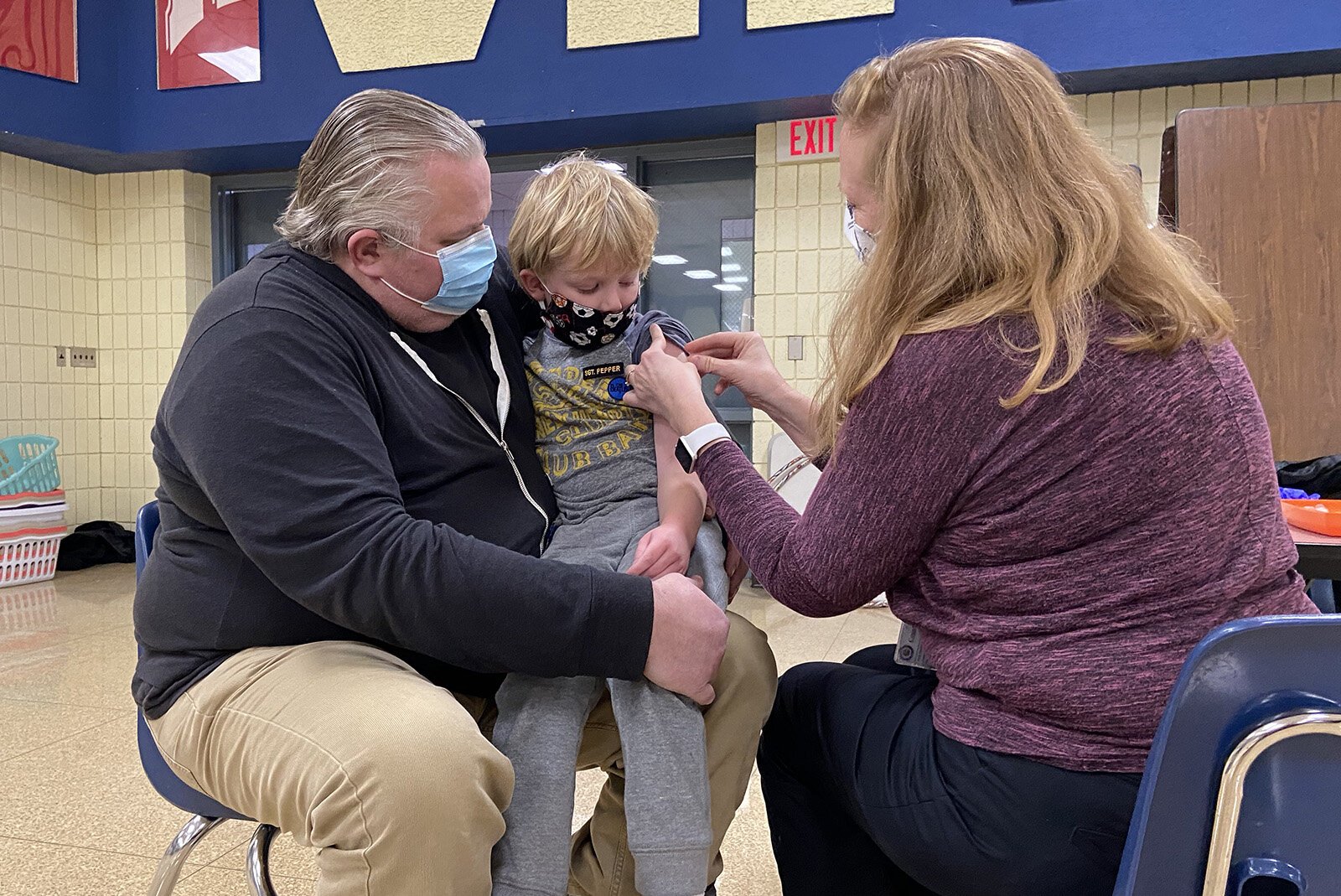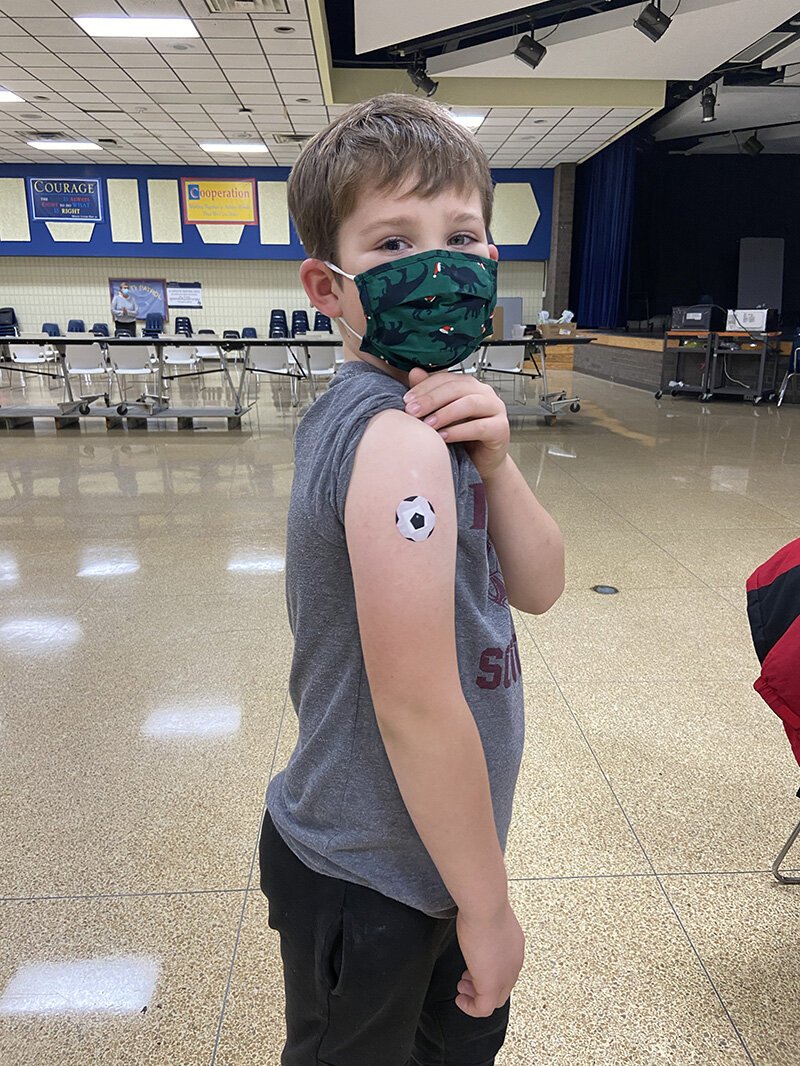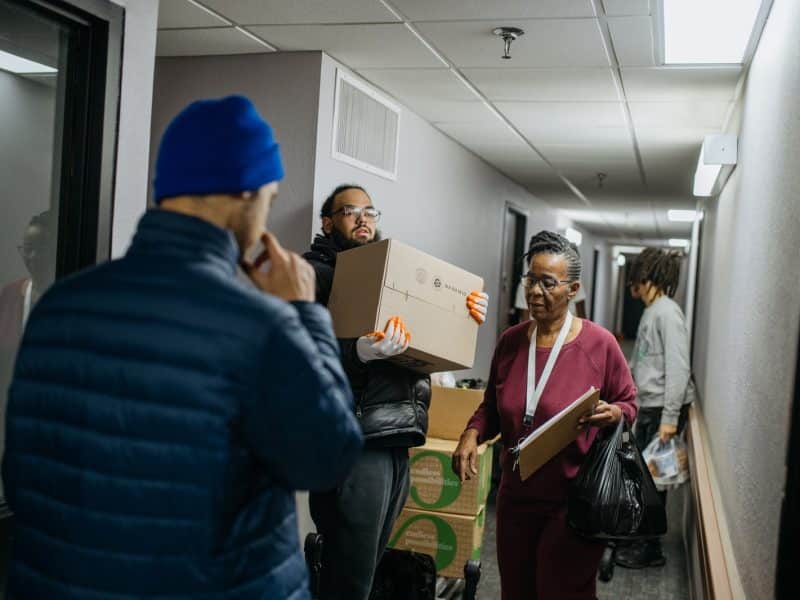
Michigan health officials are sounding the alarm that childhood vaccination rates for diseases like measles, chickenpox, and polio have yet to rebound from their slump during COVID-19 lockdowns.
This article is part of State of Health, a series about how Michigan communities are rising to address health challenges. It is made possible with funding from the Michigan Health Endowment Fund.
Michigan health officials are sounding the alarm that childhood vaccination rates for diseases like measles, chickenpox, and polio have yet to rebound from their slump during COVID-19 lockdowns.
Dr. Joseph Fakhoury, pediatrician, hospitalist with Bronson Health Care, and chair of the Michigan Chapter of the American Academy of Pediatrics (MIAAP) Immunization Task Force, keeps an eye on vaccination trends across Michigan. He notes that the portion of Michigan toddlers receiving the vaccine series that protects against diphtheria, tetanus, whooping cough, polio, measles, mumps, rubella, meningitis, hepatitis A, hepatitis B, chickenpox, and pneumonia dropped from 74% in the fourth quarter of 2019 to 67.5% in the first quarter of 2022.

“We’ve actually seen numbers that are much lower than we’ve seen in a very long time, years and years, even pre- and post-COVID,” Fakhoury says.
Adolescent and adult vaccination rates, on the other hand, have either held steady or risen slightly in Michigan. But Chelsea Wuth, Michigan Department of Health and Human Services (MDHHS) associate public information officer, says the childhood vaccination decline is “worrisome” because the pediatric population is Michigan’s “most vulnerable.”
“We are working closely with local health departments, Medicaid Health Plans, individual providers, and community organizations to bring attention to the impact of the pandemic on routine immunizations and to improve vaccination coverage throughout the state,” Wuth says.
Worker shortages, misinformation, lack of access to care drive slump

There are multiple drivers behind Michigan’s childhood vaccination slump. Toni Bulthuis, Ottawa County Department of Public Health (OCDPH) vaccination supervisor, believes two main factors, both related to the COVID-19 pandemic, are at play. For one, health care worker shortages have made it more difficult for parents to schedule their children for well-child check-ups where vaccines are routinely administered. And secondly, she says more people are resisting routine vaccinations of all sorts because of the misinformation and fear spread during the height of the pandemic.
“We are seeing staffing shortages in private provider offices and less [available] appointments because of that,” she says. “And we have more people questioning vaccines due to the COVID vaccine questions that people are having. That has rolled over onto all of the regular recommended vaccines, too.”
Fakhoury believes lack of access to medical care may be a main reason for the drop in childhood immunization rates, especially for children in families with Medicaid insurance. He notes that Medicaid patients statewide have up to 10% lower vaccination rates than non-Medicaid patients.
“That really highlights a lot of inequity, both in access and maybe in education as to why that child needs to be updated on vaccinations,” Fakhoury says. “A lot of Medicaid-reliant patients heavily relied on county health departments to provide routine immunizations. County health departments paused their immunization practices to focus on the pandemic.”
Like Bulthuis, he also cites the increase of misinformation, disinformation, and the resulting decrease in trust in medical providers. And he says the results may be severe.
“A lot of vaccine-preventable diseases had been either completely eliminated from our communities or had been minimized because of better vaccination rates several years ago. As we move towards these lower rates, there is definite concern that some of those diseases will begin to be more prominent,” Fakhoury says. “With flu season, COVID still being around, and other routine childhood illnesses that we don’t have vaccines to prevent, if we add these preventable diseases, we worry about the strain on patients, families, and the overall [health care] system.”
Playing catch-up
As the state’s health care community endeavors to turn childhood vaccination rates around, MDHHS recommends that parents bring children back in to their provider office for a well-child exam.
“If they are behind [on vaccinations], it may take a couple of appointments to get them caught up,” Wuth says. “It is necessary to provide the level of protection they need to prevent illness and diseases from returning and spreading through communities where [vaccination] rates are low and children are not protected.”

Individual health departments like OCDPH are also working hard to return routine immunization rates to pre-COVID levels. Whenever parents bring children to OCDPH for routine visits, staff recommend that the kids receive recommended vaccinations against 19 vaccine-preventable illnesses per the Centers for Disease Control and Prevention’s Child and Adolescent Immunization Schedule.
“It helps prevent any mistakes from any kind of spacing or scheduling between the vaccines because there’s certain ones that need specific spacing,” Bulthuis says. “Staying on schedule is really important.”
When Ottawa County children in the Michigan Care Improvement Registry immunization database are not up to date on vaccinations, staffers call and send letters to their parents to encourage them to get their children’s vaccines back on track.
“Each provider needs to do that, too, so they can also assist in getting kids to be vaccinated and get up to date,” Bulthuis says. “We encourage that they do that at least on a monthly basis, if possible.”
In addition, OCDPH encourages private providers to become vaccine advocates who better educate parents on the safety and efficacy of proven vaccines. With flu season here, OCDPH is using social media platforms to get the message out.
“We can all work together to get these kids back up to date and vaccinated,” Bulthuis says.
Addressing vaccine hesitancy
Michigan providers are also working to respond to misinformation and disinformation that lead parents to choose not to vaccinate their children. As part of the Parent Information Network, a collective of Michigan health care organizations, the Michigan Council for Maternal Child Health (MCMCH) has been advocating for policy changes that help increase rates of childhood vaccinations within the state and educating parents on the importance of keeping up on routine immunizations.
In Michigan, parents who do not want to immunize their children per the CDC-recommended schedule must sign a waiver in order for them to attend school. Amy Zaagman, MCMCH executive director, applauds statewide policy that requires these parents to attend an in-person vaccination education session. She also praises new Medicaid billing codes for longer parent education sessions between providers and parents.

“It’s not an easy conversation. It’s not a quick conversation. We have to make sure providers get paid properly for the time that they’re spending in working with a family and advising them,” Zaagman says. “The MIAAP has been sharing toolkits with their members, making sure that providers are equipped to have the conversation, because there’s nothing worse than having vaccine-hesitant parents in front of you and you can’t answer their questions.”
MCMCH and the MDHHS also promote the I Vaccinate campaign, which encourages parents to vaccinate their children by sharing messaging on the safety and effectiveness of routine vaccinations.
“We have vaccinations for a reason. There’s always a concern, particularly with children. They’re often in close contact with one another and in settings where disease might spread easily,” Zaagman says. “There is a concern that if we don’t have enough of the population immunized to protect against transmission that we could see a polio outbreak or a measles outbreak — chickenpox, for sure. That’s why we want to keep, for most diseases, above 95% of the population fully vaccinated to prevent that transmission.”
For information on COVID-19 vaccinations and childhood vaccinations, visit the I Vaccinate website or Michigan’s COVID-19 Vaccination information online resources.
Estelle Slootmaker is a working writer focusing on journalism, book editing, communications, poetry, and children’s books. You can contact her at Estelle.Slootmaker@gmail.com or www.constellations.biz.
Vaccination photos courtesy of Ottawa County Department of Public Health. All other photos courtesy of the subjects.




